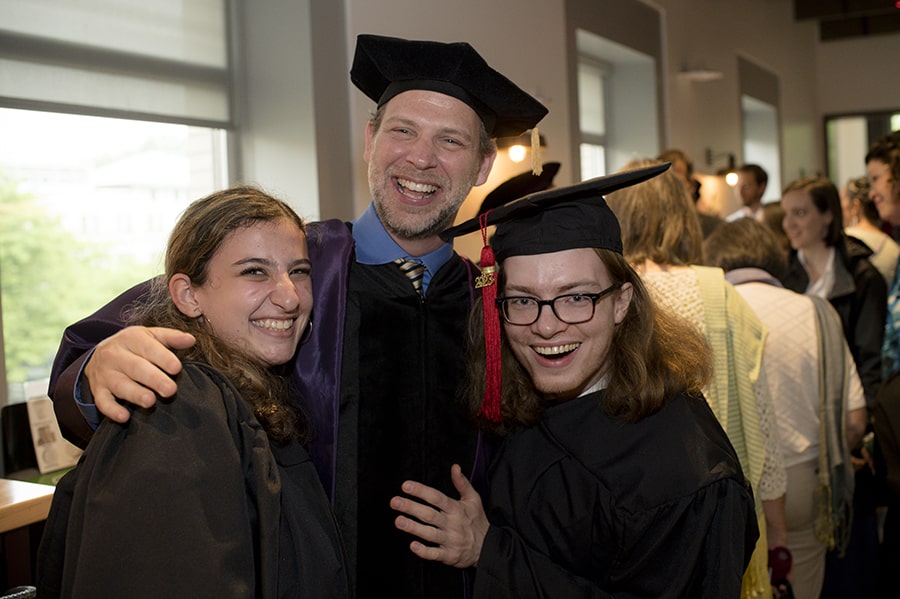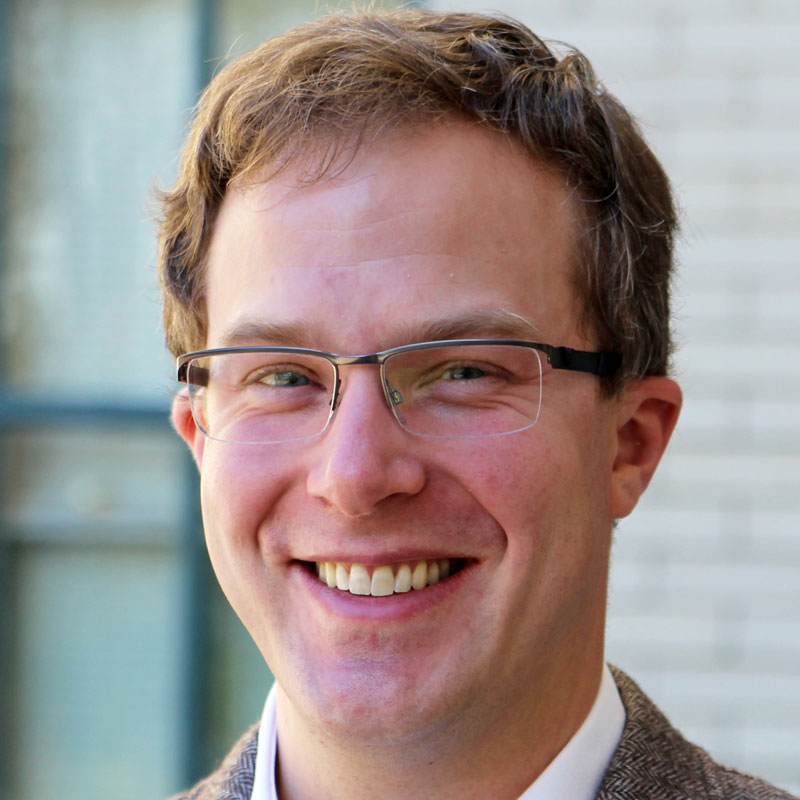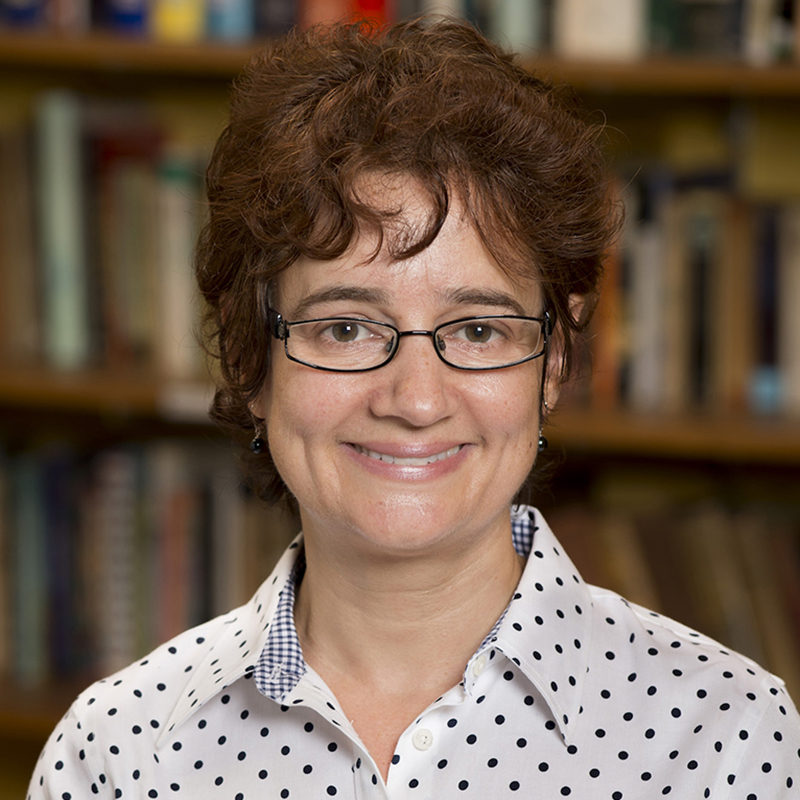Humanities Reflections
In historic times like these, humanists can help us make sense of our world by putting things in context, pondering relevant details or making apt comparisons. Below are reflections on the what it means to be a writer in the time of generative AI and about how COVID-19 has shaped our understanding of risk and metaphor.
The Impacts of Generative AI
 From left: Sonia Epstein (DC 2023), Christopher Warren and Adrian Lăpădat (DC 2023) celebrate during Commencement weekend.
From left: Sonia Epstein (DC 2023), Christopher Warren and Adrian Lăpădat (DC 2023) celebrate during Commencement weekend.
Writers are Human Beings
Speech by Christopher Warren, associate professor of English and associate department head.
Delivered at CMU’s Department of English Diploma Ceremony, May 2023.
The students here might not have focused on it because they’ve been too busy writing and partying, but there's a writers’ strike going on right now. The Writers Guild of America, which represents close to 12,000 Hollywood writers, is in a battle with the Alliance of Motion Picture and Television Producers. It isn’t new that these groups are in conflict. Hollywood writers have bargained for decades to secure their working conditions, particularly as studios and the actors who speak their lines garner most of the financial rewards. But when I was reading a New York Times article about the strike, two things caught my eye, and possibly yours too.
The first was an interview with one of Carnegie Mellon English's most distinguished alums. The article quoted former CMU Creative Writing major Javier Grillo-Marxuach, who graduated from CMU and went on to create the TV series “Lost,” among other accomplishments. Javi’s a member of the Writers’ Guild of America and also a generous supporter of our department through the Grillo-Marxuach Family Scholarship in Creative Writing (The winner this year — was Cameron Monteith — congratulations, Cameron!).
Javier gave the New York Times reporter a pithy definition of artistic creativity, which I think is worth pausing over: “Artists,” he said, “look at everything ever created and find a flash of newness.”
“Artists,” he said, “look at everything ever created and find a flash of newness.”
That's pretty good, right? It’s certainly a decent description of the poets and playwrights I find myself teaching most often, folks like John Milton and William Shakespeare, both of whom bathed in their cultural inheritance to produce striking and lasting works of literature. It’s also a good description of a more recent show like HBO’s “Succession,” whose actors include several CMU alums and whose creators have acknowledged they’ve crafted the series as “King Lear for the Media-Industrial Complex.” I like to think CMU English, including some of the folks sitting up here, helped Javier arrive at that wisdom and also gave him the fortitude to literally stand on the picket line to stand up for writing as a profession.
The second thing that caught my eye — and here I’m getting into the meat of my remarks today — was the perceived threat of artificial intelligence. This was why Javi was musing about artistic creativity in the first place. As part of their negotiations, Hollywood writers want assurance that producers won't turn to bots like ChatGPT to produce the reams of scripts, screenplays and late-night jokes that help enrich our idle hours. The article quoted WGA member Mike Schur, creator of “The Good Place” and co-creator of “Parks and Recreation,” who told the Times, “It is not out of the realm of possibility that before 2026, which is the next time we will negotiate with these companies, they might just go, ‘you know what, we’re good.’”
“We don’t need you,” he imagines hearing from the other side. “We have a bunch of AIs that are creating a bunch of entertainment that people are kind of OK with.”
Shur then said something even more bracing. Shur said the union intends to “draw a line in the sand right now and say, ‘Writers are human beings.’”
Slow: Writers are human beings. What a remarkable thing to say. What a remarkable thing to *have* to say. Stage voice: We're drawing a line.
AI is everywhere these days, and I’m as ambivalent about it as everyone else, but one thing I know is that this group of graduates here is better equipped than just about anyone else in the world right now to help us think through this moment. I don’t need to tell you that Carnegie Mellon University might as well be called ground-zero for AI automation. That’s actually good news for everyone here. That means both that today’s graduates will be stepping into this new world with a considerable tailwind from CMU’s reputation and that the world will be especially hungry for what you — as Carnegie Mellon graduates — think and know.
Right here among us we have technical writers and humanities analytics minors who understand and can communicate the technology of generative AI. We have rhetoric students who can analyze the Writers Guild’s framing as tactical public discourse. We have creative and professional writers getting their hands dirty, so to speak, testing AI tools in their classes, learning what the tools are good for, and what they’re not. And we have literature, culture, film and gender studies students powerfully attuned to the complex interactions among dominant, residual and emergent cultural practices. They know better than most that history doesn’t repeat itself, but it does rhyme.
For my part, I tend to take a historical perspective. For a long time, the phrase “A writer is a person who…” was a kind of phrasal template, the kind of thing linguists call a snowclone. “X is the new Y”; “Keep calm and X on.” “X Lives Matter”; “A writer is a person who X.” In the early 20th century, the novelist Thomas Mann said, “A writer is a person for whom writing is more difficult than for other people,” and I've always liked that. But Mann was hardly the only person trying to define a writer. Around the same time, someone else said that “writers are human beings with more than average sensitivity to the problems of living.” In 1940, Virginia Woolf wrote, “A writer is a person who sits at a desk and keeps his eye fixed, as intently as he can, upon a certain object.” H.D. Thoreau is said to have quipped, “A writer is a person who having nothing to do, finds something to do.” But I think what got me with Shur’s remark was that now, all of a sudden, we don't really care about the rest of it. The snowclone’s melted. If you ask the WGA members on the picket line, all those old-timey writers apparently could have stopped after “A writer is a person.” A writer is a person who has blue hair. A writer is a person who had Cheerios for breakfast. A writer is a person who knows what a restrictive clause is. Whatever. Generative AI has pushed us back to basics. “Writers are human beings.” Full stop.
Well, as long as we’re restating basic, somewhat banal truths, let me just be very clear: every one of these graduates today *is* a writer. We've made sure of that in our department, trust me. You’ve written poems and polemics, dissertations and documentation. You’ve tweeted, translated and transcribed.
You know what restrictive clauses are. And every one of these graduates *is* a human being, for all that means. You are passionate, embodied, intelligent, flawed. You have hopes and worries. You know what loneliness feels like, and ecstasy. You crave social justice. You believe in gods and machines. You geek out over the Oscars; you love anime. To quote a sign from the Writers’ Guild picket line, “ChatGPT doesn’t have childhood trauma.”
In all seriousness, you also know what it’s like to be inside the activity of writing, struggling for a word, swimming in the brine of language, resisting the counterfeit comforts of cliche. You know that glorious little tingle you feel when you write something crisp and true. You have families, friends and teachers who love you and want the best for you. You've had experiences, oh boy you've had experiences, not all pleasant.
As a reminder to everyone else, the undergrads and Ph.D. students graduating today completed most of their degrees during the most anxious years in my lifetime, the COVID-19 pandemic. I know we've had many moments to applaud today, but I think that deserves its own round of applause.
Everyone here knows how difficult the past few years have been, and we admire your strength and perseverance.
As graduates from Carnegie Mellon University, you also know damn well why the Writers' Guild wants to insist that writers are human beings. At this point, automation feels like part of the Carnegie Mellon brand. And as graduates of this department, you also know that no statement like “writers are human beings” could be as simple as it seems. Is that how language change works, you just Humpty Dumpty a word like “writer” into a box and make sure it stays there? “When I use a word,” Humpty Dumpty says in “Alice in Wonderland,” “it means just what I choose it to mean — neither more nor less.” No, not at all. Tell that to the word “text,” which wasn’t always a verb. “Calculators are human beings.” “Computers are human beings.” If you’ve seen the movie “Hidden Figures,” you know that “calculator” and “computer” both used to describe people rather than machines. Two centuries ago, a sentence like “computers are human beings” would have made perfect sense, and, honestly, would have been too obvious to utter. By definition, calculators were people who calculated, computers were people who computed, or counted.
At first glance, these linguistic trends might seem like bad news for the job of writer, and what do I know, maybe it is. But writers have never been only human beings. Writing has always been a collaboration between humans and their tools. Show me a writer who doesn’t already use spellcheck, or Google, or a word processor. Before that: typewriters (interesting word, no human beings there).
Writers have never been only human beings. Writing has always been a collaboration between humans and their tools.
This paper I’m reading from right now is a storage device. World’s cheapest hard drive. Ballpoint pens are tools. Dictionaries and thesauruses are tools. To assist human creativity and aid the transmission of knowledge, we invented things like page numbers, and indices at the back of books. Earlier we heard our graduates’ names in alphabetical order. You’d be surprised how recently we came up with the idea of alphabetical order. It’s a sorting algorithm. The point is, even the most technophobic writer in their cabin with a pencil and bunch of books is kind of a cyborg already. Using ChatGPT or Moonbeam.AI to start a draft might not be as big of a departure as the AI-hypers want us to think.
But even if it is, this is where CMU is your super power. Because the world is going to need writers, thinkers and storytellers who know how to practice their craft in the context of AI automation, and if nothing else, that’s what you’ve been doing here, whether on purpose or not. And you know what else? This university benefits tremendously from you. In your time here, you’ve brought soul to this campus. You’ve taught this university about contemplation, about the common good. Think how impoverished your friends with other majors would be if you weren’t there to teach them about Octavia Butler or Judith Butler. If they didn’t occasionally hear people talking about Aristotle, Habermas or Terrance Hayes. If they didn’t see how tremendously hard you’ve worked as writers and translators, worrying over the slightest nuances but also able to find deep, enduring comfort in language’s folds. I suppose I’ll end with my own sense of what it means to be a writer, or at least a CMU writer. As I see it, to be a CMU writer is to step into the world, attentive to technological change, with something vital — absolutely vital — to say.
Exploring COVID-19
 Humanities@CMU: COVID-19 and Risk
Humanities@CMU: COVID-19 and Risk
We have heard a lot about risk recently: the risk of infection with SARS-CoV-2, the risk of serious complications, the risk of failing to social distance. These risks are often expressed numerically, using case fatality rates or simulation models. But risk isn't always well conveyed by numbers.
A few centuries ago, people also understood diseases as dangerous and had a concept of chance or fortune playing a role in their survival. People did not express such risks numerically. Before risk could become calculable, the human experience had to be transformed from something capricious—or driven by moral desert and divine intervention—into a set of regularities amenable to probability.
Even today, risk eludes easy calculation. We face mortal risks all the time, but small differences in behavior or constitution often have large or unexpected effects on the calculation of any given person's risk. As a society, we can aggregate and mitigate risks, from regulating airbags to funding cancer research, which makes managing risk across a population possible. But such aggregation can also have the effect of erasing the individual, humanistic experience of risk.
I may understand a novel disease as yet another burden competing with unemployment and addiction; you may understand it as uncertainty undermining a carefully micromanaged existence. To be human today is to live in a world of competing risks, but putting numbers on them doesn't always help us navigate them. Tellingly, even our own risk calculations rarely stay consistent over time: some of us might disinfect groceries today having happily visited hospitals with antibiotic-resistant infections a year ago.
It's certainly reasonable and even desirable to use risk calculations as a guide to decision making, but quantifying risk will never capture everything that's important about it.
-Christopher J. Phillips, associate professor in the Department of History
 Humanities@CMU: Metaphors To Live By
Humanities@CMU: Metaphors To Live By
“And mark this well: When an epidemic of physical disease starts to spread, the community approves and joins in a quarantine of the patients in order to protect the health of the community against the spread of the disease.”
This quote is not from Dr. Anthony Fauci or another medical expert addressing the COVID-19 pandemic. It was President Roosevelt in 1937 presenting what is now known as the “Quarantine Speech.” Roosevelt used the metaphor of contagious disease to refer to fascism — as would George Kennan about communism — because he wanted to impress upon Americans a sense of a fast-approaching, imminent danger.
Metaphors can serve us well when we try to score a quick rhetorical success — to make an abbreviated argument and emotionally enhanced plea for action. We have seen plenty of metaphors employed to describe our crisis during this pandemic: the virus is “a silent enemy;” the lack of tests, vaccines and treatment is “a perfect storm;” we are in a “lock-down” (a term originally used for prison security protocols); New York is “under siege.” During the pandemic, quarantine is for many people real rather than metaphorical. Yet if quarantine acts as a protective bubble, it is hard to accept that we are in danger.
We have been asked to stay home not only for our own safety, but for the safety of others. This is where, perhaps, the rhetorical success of the metaphor of a political quarantine clashes with the reality of our medical quarantine, making people rebel and demand their “freedom.” Considering the militaristic language used to describe this pandemic, we can think of ourselves as warriors or victims. Perhaps it’s worth considering that we might be the saboteurs to our country’s health.
-Andreea Ritivoi, head of the English Department and Humanities@CMU Initiative